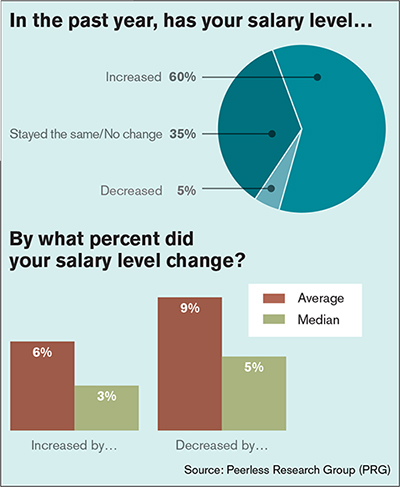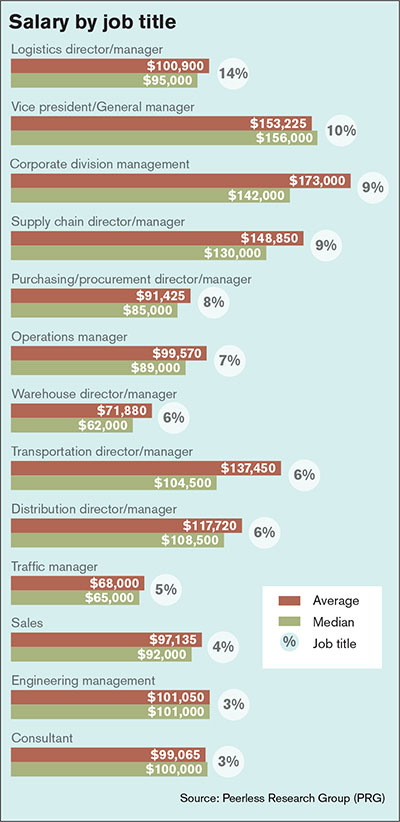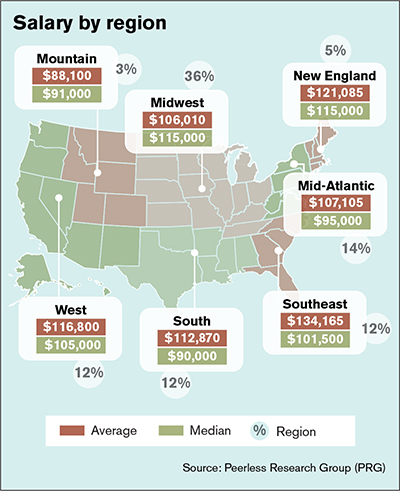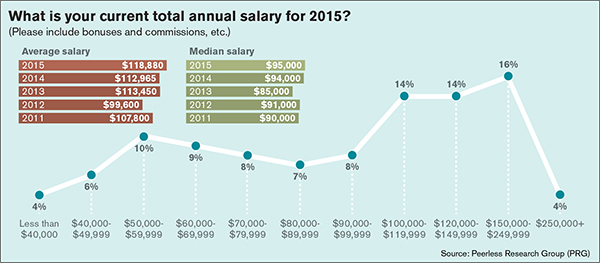31st Annual Salary Survey: Work smart, earn more
Irrespective of age, gender, or experience, the most highly compensated logistics managers are those with the best formal educations. But academics and job recruiters say leadership acumen, the ability to adapt to technology, and “cultural skills” are not to be discounted, especially over the long term.
While Logistics Management’s (LM) 31st Annual Salary Survey revealed many of the same trends surfacing in studies done in recent years, this year’s effort provides one outstanding conclusion: technological skill sets are in more demand than ever. Consequently, colleges and universities that emphasize high-tech training are producing the best qualified candidates for fast track promotions in this ever-demanding marketplace.
The 2015 report, conducted by Peerless Research Group (PRG), notes again that companies are expecting employees to take on yet more work and responsibility, suggesting that sophistication in technological adaptation will be increasingly important.
“From a statistical perspective, the evidence clearly points to workers being asked to put in more time and energy to get ahead,” says PRG’s research director Judd Aschenbrand. “Those working smarter and adapting to the necessary technological tools will certainly be able to accomplish the increasing work load at an easier pace.”
Indeed, 77 percent of our respondents report that the number of functions they are asked to perform has increased over the past year. Only 20 percent say that things have remained the same, and a mere 3 percent say that there’s been a decrease in what they are expected to deliver.
Median salaries (including bonuses and commissions) inched up from $94,000 last year to $95,000 in 2015, with 60 percent of our respondents saying that their compensation continues to improve or keep pace with the cost of living.
Managers in the 45-year-old to 54-year-old range still occupy the peak earnings on our charts, but one can see a sudden surge in the numbers for professionals comprising the 35-year-old to 44-year-old silo, too. Last year, the best and youngest members of this generation were making a median salary of $65,000, but they’re seeing that number jump to $91,000 as they approach their early 40s.
Another key takeaway from our survey is that—irrespective of gender and age—job satisfaction remains high. More than half of the respondents say that they are “very” happy.
Not to be overlooked, logistics mangers who remain with one employer long-term continue to make more money than those who chase other opportunities, but that does not mean that they lack ambition. The majority of those queried say that “job pursuit” is always on their radar.

Learning curve
Education is a recurrent theme, with respondents agreeing that continuing their learning–whether on-line or in the classroom–is a must for salary upgrades.
Those managers tenacious enough to grab an MBA lead the pack with triple-figure salaries approaching $144,000 in the median range, followed by grads with other advanced degrees earning $133,375. In fact, taking a break from business routine to pursue an advanced degree in logistics makes good sense, say some academic leaders.
Dr. Bruce Arntzen, executive director of the supply chain management program at the MIT Center for Transportation and Logistics found this year’s Salary Survey results compelling for that very reason. “As far as the value of an advanced education, our program is the ‘poster child’ for that,” he says. “Since I have been here, our 10-month program has resulted in the class average salary boost ranging between 57 percent to 81 percent. Not bad for a hiatus of less than a year out of the work force.”
Terry McDorman, CEO of MGRM Associates, an executive recruiting firm in Chicago, concurs that education matters—but only to a degree. “A lot of my supply chain candidates have learned to use technology on the job,” he says. “Remember, the new generation of managers have used high tech modeling, gaming, and forecasting software most of their young lives. Academic courses can lend authority to a resume, but in the end, companies want to see results.”
And that’s why it’s much easier for young professionals to get a better salary if they have two or three years of experience under the belts, adds McDorman. “My advice to most companies is to quickly recognize and reward achievement to their top performers, otherwise they may be gone,” he says. “A cost-of-living raise every year is not going to do it any more. The economy has improved.”

Gender gap continues
This year’s results—based on nearly 700 qualified LM readers—indicate that most logistics professionals made modest gains in earnings this year, but men continue to dominate the industry. According to our research, women still lag behind—earning a median salary of $86,370, while men with similar job descriptions pull in more than $100,000.
However, Don Firth, president of Jobsinlogistics.com, says that his on-line recruiting company is seeing more evidence that the traditional disparity in compensation is changing. “Many of the bright young people we see coming out of school are women who have realized that there’s good money in logistics,” he says. “Part of the challenge in the past has been to convey how crucial logistics management can be for even the smallest of companies. It can literally be the difference between running at a profit or a loss, and many woman gravitate toward that level of challenge.”
Like McDorman, Firth feels that both men and women can find good jobs in this field, even if they don’t have a great deal of formal education. But for those who do, especially women, the executive suite should be their target.
“We see women moving on to the C-level at an accelerating rate,” says Firth. “This mirrors a national trend, and one that should be sustainable for quite some time.”
Firth adds that a small percentage of women who have reached the highest median salaries may even be “opting out” for retirement at an earlier age than men, which may explain the ongoing discrepancy. “All indications for us are that more and more women are being attracted to the this industry and are every bit as qualified as men to advance quickly. The business culture just has to catch up with them,” concludes Firth.

Tech trends
Ted Stank, supply chain management professor and Bruce Chair of Excellence at the University of Tennessee’s Global Supply Chain Institute, notes that any way you slice it, functional IT expertise will continue to be rewarded.
“And not just for logistics managers working for manufacturers,” Stank adds. “This is also true for those being hired by third-party logistics companies. It’s interesting to see how this trend is developing as more third-parties are adding vital technology-based services.”
Joel Sutherland, managing director of the Supply Chain Management Institute at the University of San Diego, agrees that being “tech-savvy” is a critical attribute, but most companies expect this of new hires anyway. “Analytical problem-solving—especially in regard to Big Data mining—is another skill in high demand,” he says. “Project management is also key. Companies are looking for leaders who can craft and apply the proper tactics for final logistics management execution.”
Lynn Failing, vice president of supply chain recruiting firm Kimmel & Associates, notes that “soft skills,” like communications and management, are also highly valued these days.
“The new generation of logistics managers want to align themselves with a company’s culture and be shown a path toward leadership,” says Failing. “The millenials are always exchanging information through LinkedIn and Facebook, and will quickly change jobs if they are not moving forward.”

Quality of life
Newly minted logistics managers may also consider beginning their careers in the Midwest when looking for that first job. A significant number of survey respondents (36 percent) are currently working in that region while pulling down a median annual salary of $115,000—tied with New England for the highest median salary.
Jonathon Reese, the logistics manager for Celina Tent, a major manufacturer of engineered fabric products and distributing event equipment, says that Ohio was a good choice for him. “I’ve lived in this state for 11 years, and have been with Celina for the past three years,” he says. “My salary provides a good quality of life, and our company is continuing to expand in domestic and international markets.”
This sentiment was echoed by Eric Goldstein, a manager for the Abbot Laboratories distribution and logistics division in Waukegan, Ill. But cost of living advantage was not the only incentive for choosing the Midwest. “I’m originally from the South,” he says, “so it was not that expensive for me down there, either. But the salaries are good here, and Abbot is a great place to work.”
A recent graduate from the University of South Carolina, Goldstein began his career as a logistics manager for Bosch—the world’s largest automotive components company. While still in his early 20s, he welcomes the challenges of his new job. “We have a good culture, and I enjoy being just outside of North Chicago,” he says. “The region is attracting a lot of supply chain talent from all over the country.”
Patrick McDermott, director of logistics for Basco Manufacturing Company, a leading manufacturer of custom glass shower doors and enclosures based in Mason, Ohio, says there’s a “concentration of opportunities” in the region. “I moved here after graduating from the University of Tennessee to work for Proctor & Gamble,” he says. “I soon discovered that this is the ‘Silicon Valley’ for logistics managers.”
McDermott is only 35 years old, and watching his company grow at a rapid rate. He’s involved with the Tri-State Logistics Council and keeps an active social network to find new talent. “TMS is the fastest growing module in our ERP,” he says, “so job candidates must really understand the complexity of our business and be ready to hit the ground running. It’s amazing how many young people are finally discovering this business.”
Indeed, promoting logistics management as a career path for young adults was another question that proved to be revealing. An overwhelming number of respondents (83 percent) say that they would give this advice to their children and their friends.
Finally, while salaries are always a major factor in job satisfaction, our respondents placed a far greater emphasis on “feeling of accomplishment” (64 percent) and “relationship with colleagues” (52 percent). Only 48 percent say that the money is their overall concern.
Amber Hilt, logistics manager for Abaxis Veterinary Reference Laboratories, in Olathe, Kan., sums it up this way: “Unlike some professions that often cap out quickly, a career in logistics leads to better salaries as we move up the ladder. A warehouse manager, for example, can become an operations manager over time, while building efficiencies and improving your company’s value chain.”
But more importantly, Hilt says that a career in logistics permits professionals to pursue their particular passion. “Every company that moves physical goods—big or small—needs a logistics manager to guide it through the journey.”


Article Topics
Latest in Logistics
LM Podcast Series: Assessing the freight transportation and logistics markets with Tom Nightingale, AFS Logistics Investor expectations continue to influence supply chain decision-making The Next Big Steps in Supply Chain Digitalization Under-21 driver pilot program a bust with fleets as FMCSA seeks changes Diesel back over $4 a gallon; Mideast tensions, other worries cited Four U.S. railroads file challenges against FRA’s two-person crew mandate, says report XPO opens up three new services acquired through auction of Yellow’s properties and assets More LogisticsAbout the Author
Subscribe to Logistics Management Magazine

Find out what the world's most innovative companies are doing to improve productivity in their plants and distribution centers.
Start your FREE subscription today.
April 2023 Logistics Management

Latest Resources





 Click for larger view
Click for larger view











